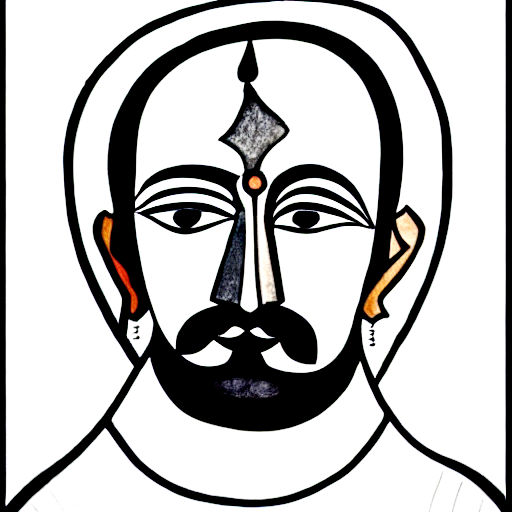Abu'l-Fath Jalal-ud-din Muhammad Akbar, popularly known as Akbar the Great, and also as Akbar I, was the third Mughal emperor, who reigned from 1556 to 1605. Akbar succeeded his father, Humayun, under a regent, Bairam Khan, who helped the young emperor expand and consolidate Mughal domains in India.
A strong personality and a successful general, Akbar gradually enlarged the Mughal Empire to include much of the Indian subcontinent. His power and influence, however, extended over the entire subcontinent because of Mughal military, political, cultural, and economic dominance. To unify the vast Mughal state, Akbar established a centralised system of administration throughout his empire and adopted a policy of conciliating conquered rulers through marriage and diplomacy. To preserve peace and order in a religiously and culturally diverse empire, he adopted policies that won him the support of his non-Muslim subjects. Eschewing tribal bonds and Islamic state identity, Akbar strove to unite far-flung lands of his realm through loyalty, expressed through an Indo-Persian culture, to himself as an emperor.
Mughal India developed a strong and stable economy, leading to commercial expansion and greater patronage of culture. Akbar himself was a patron of art and culture. He was fond of literature, and created a library of over 24,000 volumes written in Sanskrit, Urdu, Persian, Greek, Latin, Arabic and Kashmiri, staffed by many scholars, translators, artists, calligraphers, scribes, bookbinders and readers. He did much of the cataloging himself through three main groupings. Akbar also established the library of Fatehpur Sikri exclusively for women, and he decreed that schools for the education of both Muslims and Hindus should be established throughout the realm. He also encouraged bookbinding to become a high art. Holy men of many faiths, poets, architects, and artisans adorned his court from all over the world for study and discussion. Akbar's courts at Delhi, Agra, and Fatehpur Sikri became centres of the arts, letters, and learning. Timurid and Perso-Islamic culture began to merge and blend with indigenous Indian elements, and a distinct Indo-Persian culture emerged characterized by Mughal style arts, painting, and architecture. Disillusioned with orthodox Islam and perhaps hoping to bring about religious unity within his empire, Akbar promulgated Din-i-Ilahi, a syncretic creed derived mainly from Islam and Hinduism as well as some parts of Zoroastrianism and Christianity.
Akbar's reign significantly influenced the course of Indian history. During his rule, the Mughal Empire tripled in size and wealth. He created a powerful military system and instituted effective political and social reforms. By abolishing the sectarian tax on non-Muslims and appointing them to high civil and military posts, he was the first Mughal ruler to win the trust and loyalty of the native subjects. He had Sanskrit literature translated, participated in native festivals, realising that a stable empire depended on the co-operation and good-will of his subjects. Thus, the foundations for a multicultural empire under Mughal rule were laid during his reign. Akbar was succeeded as emperor by his son, Prince Salim, later known as Jahangir.
Sol turns thousands of years of human wisdom from the world’s spiritual traditions into a totally unique personality profile. To get your own profile, check compatibility with friends and much more, download the Sol App today.
Some of their strengths
Akbar The Great has many admirable traits.
Based on spiritual traditions from around the world, they are someone who can be described as Optimistic, Passionate, Intuitive, Independent, Altruistic, Smart, and Organized.
Intense and Passionate
According to Mysticism’s Astrology tradition, Akbar The Great is someone who is an intense, passionate, and intuitive person who is fiercely independent, authentic and direct when engaging with others. A person who is known for being a good communicator.
Adaptable and Versatile
Based on Daoism’s Ba-Zi or ‘Chinese Zodiac’ tradition, people who know Akbar The Great well know them as someone who can be adaptable, flexible, and polite, like a flower or a sapling.
Independent and Organized
According to Hinduism’s Jyotisha or ‘Vedic Astrology’ tradition, many would also describe Akbar The Great as someone who is independent, organized, inventive, and generous.
A person who is curious and a loves learning, who seems to always know what to say, who has an optimism that can overcome any difficult situation, and who seems to be able to master almost any skill.
Social and Intuitive
Based on the Mayan Tzolk’in or ‘Mayan Astrology’ tradition, Akbar The Great is someone who values forming deep friendships and relationships, and who has strong intuition and reasoning skills .
They are also someone who is mysterious, intuitive, and diplomatic, and who has a keen intuition, charisma, and a focus on balance and partnership.
Mysterious and Methodical
According to Judaism’s Kabbalah tradition, Akbar The Great tends to be someone who can come across as mysterious and intense, who can be a complex thinker who is methodical and intuitive, and who can overcome challenges that most others would not be able to.
Some of Akbar The Great's challenges
While Akbar The Great has many strengths, nobody is perfect. They also have some challenging traits they need to manage.
For example, Akbar The Great can be Rebellious, Complicated, Brusque, Emotionally Distant, Difficult, Perfectionist, and Domineering.
Complicated and Brusque
One of Akbar The Great's key challenges is that they are someone who can be complicated and gruff with others.
Domineering and Impatient
Akbar The Great is someone who can be demanding, egotistical, and controlling, can have a lack of judgment regarding personal finances, be argumentative and stubborn, and who can have a tendency to be withdrawn and spend time in self-imposed isolation.
Sensitive and Aggressive
Finally, Akbar The Great also can be too "touchy-feely", have a hard time expressing feelings, be too aggressive and headstrong, and be too unforgiving of others' mistakes.

